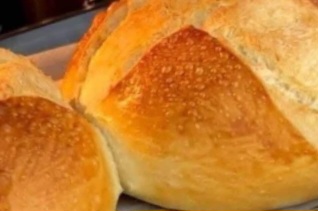Ingredients
- Dry Yeast: 10 grams (1 packet)
- Warm Water: 200 ml (1 glass)
- Flour: 720 grams (6 cups) + 120 grams (1 cup) for initial mixing
- Salt: 10 grams (1 teaspoon)
- Egg Yolk: 1
- Milk: 1 tablespoon
Preparation
- Dissolve the dry yeast in warm water and stir until dissolved.
- Mix in 120 grams of flour until smooth. Gather the dough, cover, and let it rest for 15 minutes.
- Add 400 ml of warm water, mix well, then gradually add 720 grams of flour and salt. Knead for 3-4 minutes until a soft, slightly non-sticky dough forms.
- Cover the dough and let it ferment until it doubles in size. Remove air, gather, and divide into two parts. Roll each into a ball and let rest for 10 minutes.
- Flour the surface lightly, expand the dough with your fingers, then roll it inward. Repeat with the second dough.
- Arrange the dough on a baking tray, cover, and leave for 20 minutes. Brush with a mixture of egg yolk and milk, then bake at 200°C (392°F) until golden brown, about 25-30 minutes.
Serving Suggestions
- Serve warm with butter or your favorite spread.
- Great alongside soups, salads, or as a sandwich base.
Cooking Tips
- Ensure the water is warm, not hot, to activate the yeast properly.
- Avoid over-kneading the dough to keep it soft and light.
- If the dough is too sticky, add a little more flour as needed.
Nutritional Benefits
- Provides a good source of carbohydrates for energy.
- Homemade bread can be lower in preservatives compared to store-bought options.
Dietary Information
- This bread recipe contains gluten due to the flour.
- Suitable for vegetarians.
Nutritional Facts (per serving)
- Calories: 150
- Total Fat: 1.5g
- Saturated Fat: 0.5g
- Cholesterol: 20mg
- Sodium: 300mg
- Total Carbohydrates: 30g
- Dietary Fiber: 1g
- Sugars: 1g
- Protein: 4g
Storage
- Store in an at room temperature for up to 3 days.
- For longer storage, freeze in a resealable bag for up to 3 months. Thaw at room temperature or warm in the oven before serving.
